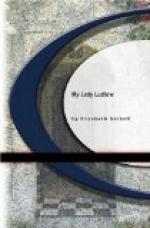I looked over my mother’s shoulder to read the letter; it began, “Dear Cousin Margaret Dawson,” and I think I felt hopeful from the moment I saw those words. She went on to say,—stay, I think I can remember the very words:
’Dear cousin Margaret Dawson,—I have been much grieved to hear of the loss you have sustained in the death of so good a husband, and so excellent a clergyman as I have always heard that my late cousin Richard was esteemed to be.’
“There!” said my mother, laying her finger on the passage, “read that aloud to the little ones. Let them hear how their father’s good report travelled far and wide, and how well he is spoken of by one whom he never saw. Cousin Richard, how prettily her ladyship writes! Go on, Margaret!” She wiped her eyes as she spoke: and laid her fingers on her lips, to still my little sister, Cecily, who, not understanding anything about the important letter, was beginning to talk and make a noise.
’You say you are left with nine children. I too should have had nine, if mine had all lived. I have none left but Rudolph, the present Lord Ludlow. He is married, and lives, for the most part, in London. But I entertain six young gentlewomen at my house at Connington, who are to me as daughters—save that, perhaps, I restrict them in certain indulgences in dress and diet that might be befitting in young ladies of a higher rank, and of more probable wealth. These young persons—all of condition, though out of means—are my constant companions, and I strive to do my duty as a Christian lady towards them. One of these young gentlewomen died (at her own home, whither she had gone upon a visit) last May. Will you do me the favour to allow your eldest daughter to supply her place in my household? She is, as I make out, about sixteen years of age. She will find companions here who are but a little older than herself. I dress my young friends myself, and make each of them a small allowance for




